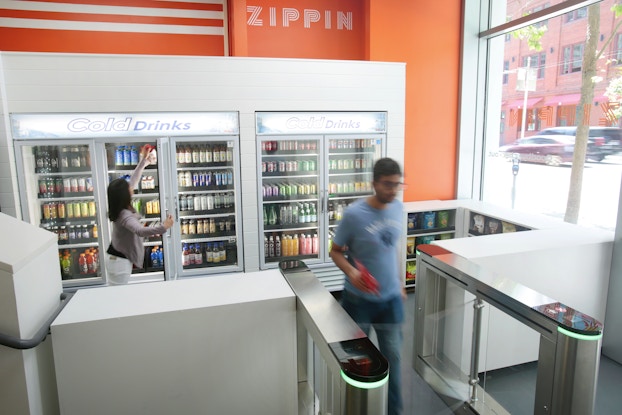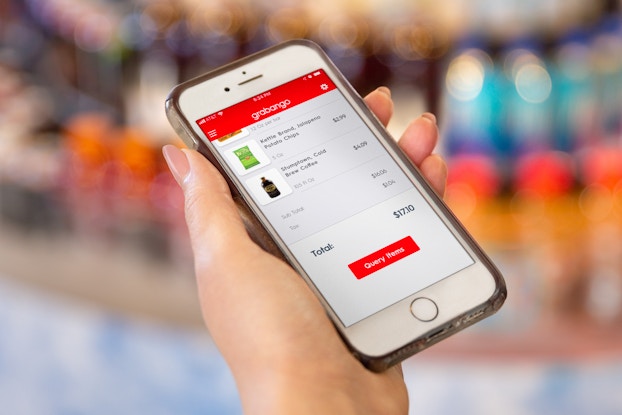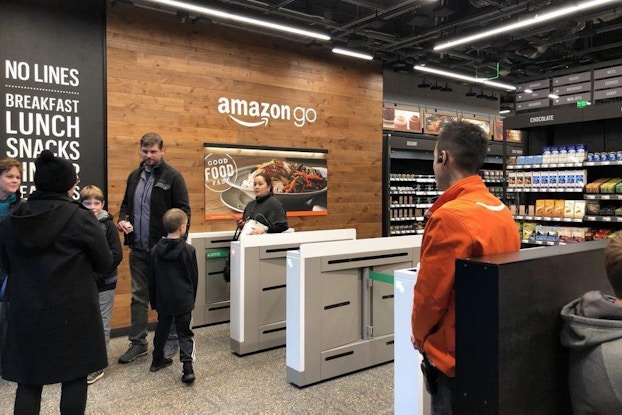
According to a recent study conducted by Forrester Research, waiting in the checkout line is the top complaint among U.S. grocery, mass-merchandise, and convenience store shoppers.
Mega-retailer Amazon and a quartet of well-funded retail technology startups — Zippin, Standard Cognition, Grabango and Trigo — believe they have the solution to the problem: Checkout-free stores powered by various technologies that enable shoppers to walk into the store, grab what they want off the shelves and just walk out. No checkout required.
Autonomous checkout, another term for checkout-free, is becoming one of the hottest areas of retail investment today. It’s all about reducing consumer wait times, enhancing the customer experience, and to a certain degree, reducing labor costs.
It comes as the convenience expectations of today’s Amazon-shopping, Grubhub-ordering, Uber-hailing consumers are ever-increasing, and informing their in-real-life (IRL) shopping demands. Brands are responding in kind, delivering digital services aimed at automating mundane tasks — in this case, the checkout process — so much so that the result is meant to feel “automagical,” according to trend forecasting firm TrendWatching.
Checkout-free retail has the potential to make shopping even more convenient, retail technology consultant Richard Crone said at this summer’s National Retail Federation’s NRF Tech 2019 conference in San Francisco. Crone moderated a panel featuring the founders of Zippin, Standard Cognition, Grabango and Trigo at the conference.

“Retailers of all types, particularly grocery and convenience stores, are considering implementing autonomous checkout technology, where a mix of cameras and sensors track shoppers as they select items throughout the store and compile an in-app receipt with embedded payment,” Crone said. “What you experience in these stores is a completely free business model where every consumer is known, contactable and preauthorized before they enter the store.”
By “completely free,” Crone is referring to the added benefit of free data generated by these checkout-free systems. Indeed, they have the ability to compile data on consumers that traditional point-of-sale systems aren’t capable of collecting.
Amazon Go kicks off the trend
Amazon kicked off the checkout-free technological revolution with its first Amazon Go convenience store in Seattle in 2016. That store was for company employees only, but in late 2018 it opened the small cashierless convenience store to the public. After some initial fits and starts, there’s been no turning back. To date, the company has opened 15 Amazon Go stores in Seattle, Chicago, San Francisco and New York City, and has announced plans to open 18 more.
Amazon’s checkout-free platform uses several technologies including computer vision, deep learning algorithms and sensor fusion to automate much of the purchase, checkout and payment steps associated with a retail transaction. Customers simply download an app, enter the store, choose their purchases and, when finished shopping, walk out. The products are charged to the customer when he or she picks them off the shelves, then totaled and debited automatically to the customer’s account.
What you experience in these stores is a completely free business model where every consumer is known, contactable and preauthorized before they enter the store.Richard Crone, retail technology consultant
Innovate
Several startups are now hopping on the cashierless checkout train — a new wave in the consumer convenience movement. Read more ways successful startups are catering to consumers' desires.
Amazon had both first-mover advantage and proprietary ownership of checkout-free technology for a short period of time. But that’s no longer the case because in the last two years, a number of well-funded startups, most prominently San Francisco-based Zippin and Standard Cognition, Berkeley Calif.-based Grabango, and Israel- and U.S.-based Trigo Vision, have developed and commercialized their own versions of checkout-free technology.
Startups partner with big retail to take autonomous checkout mainstream
What was briefly proprietary for Amazon is now a cashierless store free for all. Check-in is the new checkout, at least if these startups and their retail partners have their way.
Zippin has inked a partnership with Lojas Americanas, Brazil’s largest grocery and convenience retailer. Zippin has its own demonstration store in San Francisco, where it’s courting U.S. grocery and convenience chains.
It's also opening the first checkout-free convenience store in a sports arena at the Golden 1 Center in Sacramento, the home of the NBA's Sacramento Kings.
Standard Cognition announced a partnership with Japanese wholesale, retail and logistics company Paltac. The company says its checkout-free technology is currently operating in five stores in the U.S. and Japan but isn’t disclosing the store names. Like competitor Zippin, Standard Cognition also has a demonstration store in San Francisco which it’s using to lure new retail partners.

Meanwhile, Grabango recently announced a deal with U.S. grocery chain Giant Eagle and says it will likely sign a second major partnership before the end of the year.
Trigo joined forces with Tesco, which is the largest retailer in the UK and operates supermarkets, hypermarkets and convenience stores throughout Europe, and with 280-store Shufersal, Israel’s largest supermarket chain.
According to Chris Walton, CEO of Omni Talk and Red Archer Retail, and the former vice president of Target’s Store of the Future, a key reason these startups are gaining traction in partnering with major retailers is because unlike Amazon Go, their “hybrid” automated checkout systems give consumers the ability to choose how they shop, assuming retailers offer traditional full-service checkout and self-service checkout along with checkout-free options in their stores.
With Amazon Go, by contrast, everyone has to shop the same way. But with the startups’ in-store systems, experiences can be tailored to the type of trip the shopper is making, he said.
It’s a myth that checkout-free means cashierless retail, according to Walton.
“The beauty of a hybrid automated checkout experience approach is that retailers by way of what their consumers demand can decide how cashier-free or how cashier-plenty they want their future retail experiences to be.,” he said.
CO— aims to bring you inspiration from leading respected experts. However, before making any business decision, you should consult a professional who can advise you based on your individual situation.
CO—is committed to helping you start, run and grow your small business. Learn more about the benefits of small business membership in the U.S. Chamber of Commerce, here.







